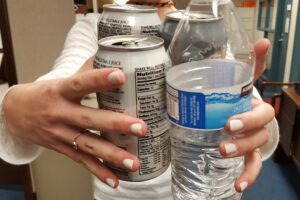 TRENTON The Department of Environmental Protection is awarding more than $14 million in grants to municipal and county governments to enhance recycling efforts, Commissioner Catherine R. McCabe announced recently
TRENTON The Department of Environmental Protection is awarding more than $14 million in grants to municipal and county governments to enhance recycling efforts, Commissioner Catherine R. McCabe announced recently
The annual recycling tonnage grants are awarded through the state's Recycling Enhancement Act, which authorizes a $3 per ton surcharge on trash disposed at solid waste facilities to fund recycling efforts. The DEP allocates this money back to municipalities and counties based on their recycling accomplishments. This year's grants are based on recycling performance in 2017.
Recycling remains an important way for residents to help protect the environment, Commissioner McCabe said. Recycling conserves resources, reduces the amount of trash that is sent to solid waste facilities, and helps reduce emissions of greenhouse gases. These grants will fund efforts that have become even more important as we look for ways to address changes and challenges in recycling markets that are occurring across the nation.
Recipients use the grants to improve recycling rates through a variety of initiatives, including funding recycling coordinator positions, providing recycling receptacles and pickup in public places, upgrading recycling drop-off centers, conducting education and outreach, and implementing curbside recycling pickup programs.
Ventnor will receive $12,805, MARGATE $8,753, and Longport $1,725 to help with recycling efforts.
In 2017, New Jersey generated 9.6 million tons of municipal solid waste, with 3.85 million tons recycled, for a 40% municipal solid waste recycling rate, compared to 44% in 2016.
The DEP attributes the 4% decline in the 2017 municipal solid waste recycling rate to manufacturers of consumer products, such as drink bottles, continuing to shift to lighter materials such as plastic over glass. Manufacturers are also using thinner and lighter weight plastics. In addition, the volume of newspaper recycled continues to shrink as consumers increasingly rely on smartphones, tablets, and other electronic devices for information.
The 2017 recycling rate does not fully reflect challenges recycling programs in New Jersey and across the nation have been facing since mid-2017 as China and other nations started rejecting recycling shipments that contain non-recyclable materials, an issue known as recycling contamination. Beginning in early 2018, China began banning the importation of most recyclable materials and other nations have followed.
Some examples of recycling contaminants are plastic bags, syringes, auto parts, non-recyclable types of plastic, Styrofoam cups, improperly rinsed and cleaned food containers, food packaging that can't be cleaned such as soiled pizza boxes, and trash.
To help municipal and county governments address these contamination challenges, the DEP has launched the free RecycleCoach app, which provides convenient access to municipal recycling program information, spelling out what can be recycled on the local level. Residents in Atlantic County can log onto ACUA.com to chat with a representative on property recycling methods.
The DEP is also making available up to $1 million in grants for New Jersey's higher-education institutions to conduct research and demonstration projects that strengthen recycling in the state.